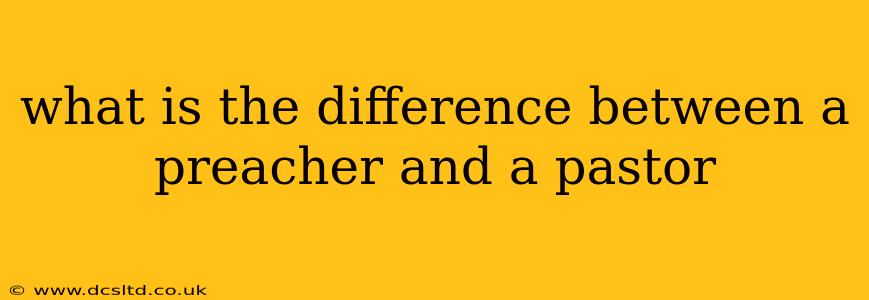What's the Difference Between a Preacher and a Pastor?
The terms "preacher" and "pastor" are often used interchangeably, leading to confusion. While both roles involve spiritual leadership and guiding a congregation, there are key distinctions in their responsibilities and approaches. Understanding these differences requires looking at the historical context, denominational variations, and the evolving nature of religious leadership.
What Does a Preacher Do?
Traditionally, a preacher is primarily focused on proclaiming the gospel through sermons and public speaking. Their main responsibility is delivering powerful and inspiring messages based on scripture, often emphasizing evangelism and conversion. The role often emphasizes charismatic communication, connecting with the audience on an emotional level to inspire faith and action. Preachers may or may not be formally educated in theology, though many are. The emphasis lies on the delivery and impact of the message itself.
What Does a Pastor Do?
A pastor, on the other hand, encompasses a broader range of responsibilities extending beyond simply preaching. Pastoring is more of a holistic role that involves shepherding the congregation—leading, caring for, and nurturing the spiritual and often emotional well-being of its members. This includes:
- Preaching: While preaching remains a crucial aspect, it's often integrated with other pastoral duties.
- Teaching: Pastors typically lead Bible studies, Sunday school classes, and other educational initiatives.
- Counseling: Providing spiritual guidance, pastoral care, and support to individuals and families within the congregation.
- Administration: Overseeing church administration, finances, and organizational matters.
- Community Engagement: Often involved in outreach programs and building relationships within the broader community.
Are There Overlapping Responsibilities?
Yes, there's significant overlap. Many pastors are also preachers, and many preachers perform some pastoral functions. The lines blur considerably in smaller congregations where a single individual might handle all aspects of spiritual leadership.
How Do Denominational Differences Affect the Roles?
Denominational practices significantly influence the distinction between preacher and pastor. Some denominations, particularly those with a strong emphasis on evangelism, might place greater emphasis on the preaching role. Others, with a focus on community building and pastoral care, may use "pastor" more broadly to describe someone with a wider range of responsibilities. In some non-denominational churches, the terms are used almost interchangeably.
What About Other Related Terms?
You'll also encounter related terms like "minister," "reverend," and "priest." These terms can further complicate the distinction, as their usage varies significantly across different denominations and theological traditions. Generally, "minister" is a more encompassing term referring to anyone ordained for religious service, while "reverend" is a title of respect often applied to ordained clergy. "Priest" is specifically used within certain branches of Christianity, such as Catholicism and Anglicanism, referring to individuals with specific liturgical functions.
In Summary: The Key Differences
The key difference lies in the emphasis:
- Preacher: Focuses primarily on preaching and proclaiming the gospel.
- Pastor: Encompasses a broader range of responsibilities, including preaching, teaching, counseling, administration, and shepherding the congregation.
Ultimately, the specific roles and responsibilities of preachers and pastors vary considerably depending on the context, denomination, and individual church. The titles themselves don't always clearly define the full scope of their work.
